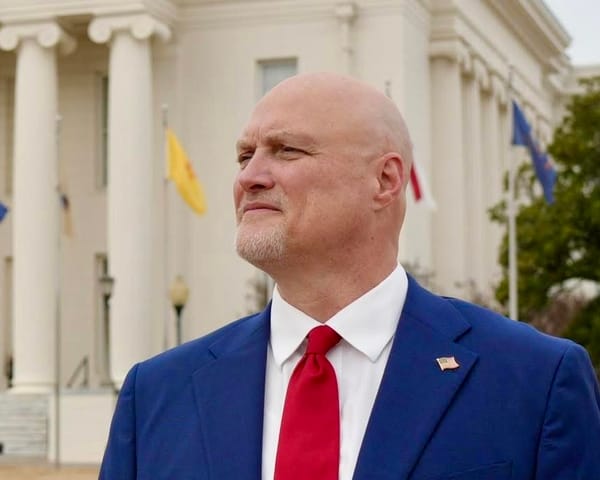DC shooting puts 2021 ALLIES Act back in the spotlight
From Alabama’s delegation, only Mo Brooks and Barry Moore voted NO on Act

The daytime attack near the White House that left two West Virginia National Guard members badly wounded has reopened old questions about how the United States handled the 2021 Afghan evacuation and the visa programs meant to protect U.S. allies.
Officials identified the suspect as 29-year-old Rahmanullah Lakanwal, an Afghan national who, according to multiple federal statements and reporting, arrived in the United States in September 2021 under the post-withdrawal evacuation program known as Operation Allies Welcome. The FBI is investigating the attack as a possible act of terrorism; the U.S. attorney in Washington, Jeanine Pirro, said the suspect used a .357 revolver in what she called a “brazen and targeted” assault.
President Donald Trump called the shooting “an act of terror” and demanded a re-examination of Afghan admissions during the Biden administration, while federal agencies moved quickly to halt or review certain Afghan immigration processing. FBI Director Kash Patel said the probe is “coast to coast,” and federal authorities confirmed the suspect had worked with U.S.-backed units in Afghanistan before being evacuated to the U.S. in 2021.
Operation Allies Welcome was the U.S. program created during the chaotic 2021 withdrawal from Afghanistan to evacuate and temporarily resettle Afghans who had worked with U.S. forces and who faced threats from the Taliban. The program included parole and temporary processing that let tens of thousands of Afghans into the country quickly while longer-term immigration steps proceeded. The Department of Homeland Security later archived material describing its role coordinating the federal response to resettle vulnerable Afghans.
That emergency resettlement effort is distinct from the ALLIES Act of 2021, which Congress debated and passed in July 2021 to expand and speed the Special Immigrant Visa (SIV) process for Afghans who had directly helped U.S. forces. The ALLIES Act (H.R. 3985) increased the cap on SIVs and relaxed some eligibility and procedural rules so more at-risk Afghans and their families could qualify and be processed more quickly. The legislation’s stated goal was to prevent further harm to people who had taken risks to help American troops.
The ALLIES Act passed the House overwhelmingly on July 22, 2021, by a vote of 407 to 16. All 16 “nay” votes were cast by House Republicans. Of the Alabama delegation, only Reps. Mo Brooks and Barry Moore voted no. That detail has drawn renewed attention in the wake of the shooting because the suspect entered the U.S. under the evacuation/resettlement process tied to those 2021 efforts.
The 16 lawmakers who voted against H.R. 3985 (ALLIES Act of 2021):
- Andy Biggs — R, Arizona.
- Lauren Boebert — R, Colorado.
- Mo Brooks — R, Alabama.
- Scott DesJarlais — R, Tennessee.
- Jeff Duncan — R, South Carolina.
- Bob Good — R, Virginia.
- Paul Gosar — R, Arizona.
- Marjorie Taylor Greene — R, Georgia.
- Kevin Hern — R, Oklahoma.
- Jody Hice — R, Georgia.
- Thomas Massie — R, Kentucky.
- Barry Moore — R, Alabama.
- Scott Perry — R, Pennsylvania.
- Bill Posey — R, Florida.
- Matthew Rosendale — R, Montana.
- Chip Roy — R, Texas.
Rep. Jason Crow (D-CO), the bill’s lead sponsor and an Army veteran, warned at the time that “some members of this body, including me, may not be here today without the service and self-sacrifice of Afghans who answered the call to serve shoulder to shoulder with us.” That argument—that congressional action was a moral and operational obligation to people who helped U.S. forces—was the central defense of the ALLIES Act.
Lawmakers who opposed the measure cited national-security and vetting concerns. In 2021, several GOP members said the expansion could widen eligibility in ways that lowered vetting standards or left the program open to fraud. That debate has returned to the fore after this week’s shooting, with critics saying rapid evacuations and emergency parole created gaps that require fresh review; supporters warn against using one violent act to stigmatize thousands who were brought here after helping U.S. personnel.
Rep. Barry Moore (R-AL1), told ALPolitics.com that, “
“First, my prayers are with the National Guardsmen, their families, and all who were affected by the horrific attack in Washington.
“I voted against relaxing vetting and visa restrictions for Afghan nationals because national security cannot be compromised for convenience. When we lower standards, we put American lives at risk, especially the men and women who wear the uniform. My priority will always be the safety of our troops and our communities.”
Moore is currently running for Alabama’s open U.S. Senate seat being vacated by Tommy Tuberville, who is leaving the Senate to run for Governor of Alabama.
Former Republican Rep. Mo Brooks, who represented AL5 from 2o11 to 2023, told ALPolitics.com:
“Those who voted for the so-called ALLIES Act of 2021 had absolutely no compassion for the American lives they put at risk with their “yes” votes, or were perfectly okay with giving Afghanistan to the Taliban, America’s enemies, or both.
“Those who voted against the Allies Act cared about American lives and did not want America’s enemy, the Taliban, again governing Afghanistan.
“Anyone with a brain larger than the size of a pea knew with absolute certainty that the Allies Act put American lives at risk. The only question is how many American dead would result.
“Another huge negative about the Allies Act is that it helped cause the Taliban to conquer Afghanistan by encouraging the very Afghans who would have fought the Taliban to cut and run to America, thereby betraying the principles so many American military personnel fought and died to promote in Afghanistan.”
“It is most unfortunate so many Congressmen and Senators are so utterly clueless or have such disregard for the cascading effects of the policies they enact.”
Case Dixon, who is running against AL6 incumbent Gary Palmer—who voted in favor of the ALLIES Act—called the attack “preventable,” saying
“This attack is tied directly to choices Congress made. When Afghanistan collapsed, Congress didn't tighten security. They expanded entry. Gary Palmer helped vote those expansions into law."
Following the attack, U.S. Citizenship and Immigration Services said it paused processing of Afghan-related immigration requests while DHS and other agencies ordered reviews of immigration histories and vetting practices for some evacuees. Officials have emphasized that the current probe is ongoing and investigators are reviewing the suspect’s background, travel history and any known associates. The FBI has characterized the investigation as nationwide and international in scope.
For families of the Guard members and for communities that sent troops to the capital, the shooting is a deeply personal tragedy. Washington Mayor Muriel Bowser said the young soldiers “should be at home in West Virginia with their families.” Military and law-enforcement leaders praised the quick response that prevented further loss of life, while national leaders called for tighter reviews of certain immigration tracks.
The case has reopened old arguments and placed the 2021 evacuation and the ALLIES Act back in the headlines. The ALLIES Act was intended to speed protections for Afghan allies. The DC shooting has raised fresh questions and seems to validate critic’s worry that parts of an emergency, expedited process left gaps. With investigators probing motive, vetting and policy, the clash between national security and promises to wartime partners is playing out not just in Washington committee rooms, but in news conferences and at kitchen tables across the country—and promises to be a hotly-debated issue in Alabama this cycle.
Updated 4:10 PM 11/28 to include comment from Rep. Mo Brooks.




